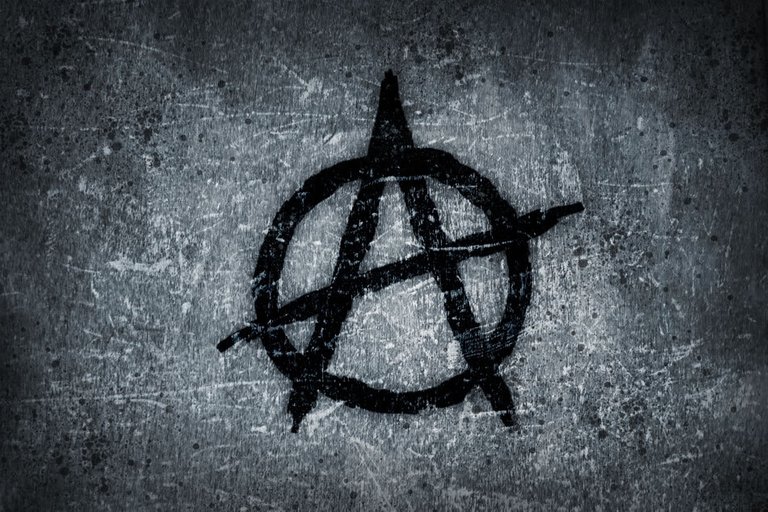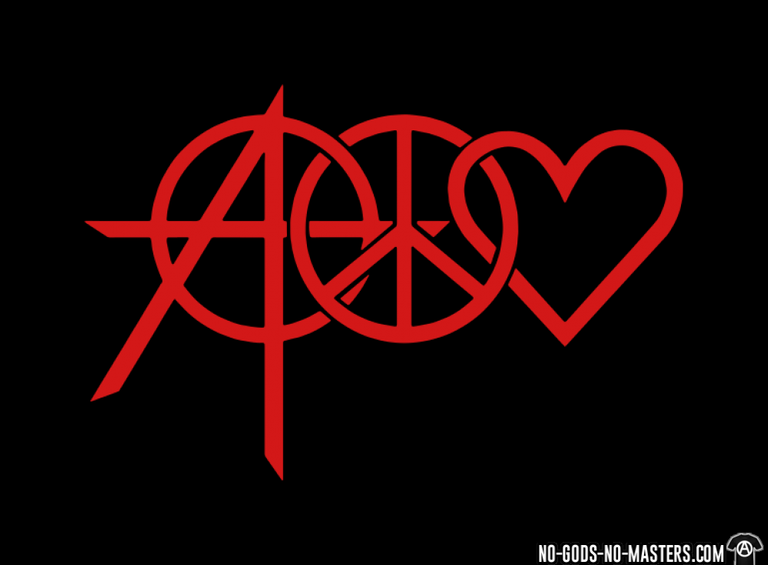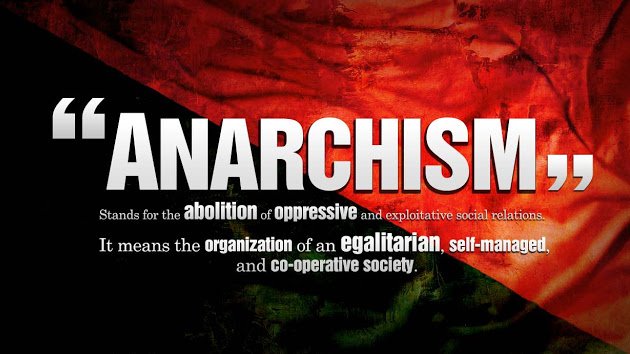Short Explanation Of A Complex Subject

Freedom
Anarchism is based on a radical and complex conception of freedom that could be divided into three parts.
- Like liberals, anarchists have a negative view of freedom, that is freedom is the absence of constraints. Thus, the individual must be free from constraints external to himself.

To this negative conception is added a positive conception of freedom since they consider that freedom is also a potentiality, the possibility for the individual to realize and to flourish all his qualities.
Finally, the anarchists have a social conception of freedom, which has the consequence of inseparably linking freedom and equality. Indeed, anarchism postulates that the individual can be free only within a solidarity society composed of free individuals. Thus, according to Bakunin, man is truly free only so far as his freedom, freely recognized and represented as a mirror by the free consciousness of all others, finds confirmation of its extension to infinity in their freedom . Man is truly free only among other equally free men; and as it is free only as a human being, the slavery of a single man on earth, being an offense against the very principle of humanity, is a negation of the liberty of all (Revolutionary Catechism).
A project of libertarian society
Anarchist is anyone whose project of society is determined by these positive and social conceptions of freedom. This project varies according to the situations (social, cultural, historical, geographical ...), but it always proposes the autonomy of individuals in the responsibility, the self-management of the communities within the framework of non-hierarchical, radically democratic social structures, decentralized and federalist.

Human nature
Anarchists have in common a perception of human nature that justifies the viability of such a libertarian society.
Yet this perception is rich in differences. For example, the Russian Kropotkin considered that the instinct of cooperation and mutual aid predominated in all animal species and found its perfect embodiment in humans. Other libertarians (such as Peter Marshall) have rather developed an existentialist view of human nature, believing that human behavior adapts to social structures and norms. All of them, however, agree that the only possible harmonious future for humanity is a refusal of economic exploitation (human beings, continents of the south, resources of the planet ...) within the framework of a society finally liberated from the relations of domination and power.
Here's the common used logo which resumes this idea:



Reviews of current society
All the variants of anarchism have in common an anti-authoritarian criticism of contemporary societies.
Anarchists dispute all relations of hierarchical domination, of whatever nature (economic, social, cultural, skin color, sex ...). Anarchist criticism extends to all oppressive institutions, such as the Church, the traditional school, the enterprise, the political parties ... and in the first place to the State (army, police, social control, order moral ...), which they regard as the very incarnation of domination.

The extent of this criticism is one of the factors that distinguishes anarchism from Marxism. Anarchism opposes oppression as much as exploitation, authority as much as property and the state as much than capitalism. This explains why many ecologists, feminists, pacifists, trade unionists and human rights activists are attracted by this radical social criticism of our societies.
Strategies of Change
Finally, the anarchists have in common to propose strategies of revolutionary change implying the immediate institution of their self-managed political project. They have always opposed authoritarian communist strategies (transition by a pseudo-dictatorship of the proletariat) and the conquest of state power by hierarchical political parties. They are generally abstentionist during elections ("standing for election to a deliberative assembly while refusing to take up any seats won or otherwise participate in the assembly's business.") without making it an immutable rule. Anarchists work above all in social movements and advocate direct action (preferably nonviolent) and the self-organization of citizens at the grassroots level.

It was on the strategies of change that the anarchists were most divided. For example, some advocated, mainly during the last two decades of the nineteenth century in my neighboring country, France, at a time when capitalist exploitation was particularly fierce (child labor, forced transfer from agriculture to nascent industry ...) a form of violent direct action called propaganda by the fact. But after a wave of individual attacks that led only to popular rejection and a renewal of state repression, this strategy was abandoned in favor of an investment by libertarians in the social movement.
Anarchists insist today on community action (collective, social centers, coordination ...), on the formation of alternative institutions on a local basis (libertarian schools, self-managed agricultural communities, production cooperatives, free radio and press associative ...) which are real miniature laboratories of what could be a libertarian society.
Anarcho-syndicalists, for their part, focus their strategy on mass action in companies and the construction of trade unions conceived as the embryos of the new society. They advocate forms of direct action such as sabotage, boycott, partial strike and general management and expropriating strike.
Anarcho-pacifists insist on non-violent direct action and civil disobedience as a means of overthrowing the oppressive hierarchical order. Although they are revolutionaries, anarchists do not reject partial, intermediate forms of struggle and daily.

On the contrary, other theoreticians consider that evolution and revolution are part of the same process and that each action can be effective if it is part of a perspective anti-authoritarian. Libertarians consider self-education and education to be among the main levers to access a society of free, autonomous and responsible human beings. Let us conclude that a minority of libertarians is not revolutionary. They argue that "big night dreams" are themselves potentially repressive, and believe that it is up to the individual to liberate himself by rejecting the dominating society.
For many individualists, being an anarchist means being "outside" and living according to one's own principles, by refusing to collaborate with oppressive institutions. This attitude sometimes leads to a form of aristocratic individualism of Nietzschean inspiration.
What kind of anarchist are you or would you be?. Or maybe you simply wouldn't? Tell me in the comments!
Image: 1 , 2 , 3 , 4 , 5 , 6 , 7 , 8 , 9
Great article which explain that what is anarchism and its basic principles. Why is it so important? Because we live in amazing time. Enough call to mind in what network it posted. The Steemit - social platform which basing on blockchain technology, that mean absolute decentralized and independent from the regulators. Users themselves determine what is useful or not. Not to be surprise if in the foreseeable future we can get this or similar in the real life.
I following to you. Thank for good post!
Thank you for passing by Crax.
You're totally right, we live in an amazing time, and Steemit is the perfect social platform to get rid of the centralized social media full of publicity and brainwashing. We are the future my friend!
This gem of a post was discovered by the OCD Team!
Reply to this comment if you accept, and are willing to let us share your gem of a post! By accepting this, you have a chance to receive extra rewards and one of your photos in this article may be used in our compilation post!
Gems! We strive for transparency.You can follow @ocd – learn more about the project and see other
Hello Yes please! I hope it's not too late. :D
By the way, if you choose me once more in the future, I will always accept, don't ask my permission, just post this comment, and it will always be yes! <3
But it was enough to have an anarchist society should not be oppressed by the strongest so that it does not impose itself on the weak? For this reason, do the liberals maintain the figure of the state and thus protect citizens from any coaction?
I'm not sure to fully understand your question. But yes, if we choose an anarchist society, the weakest could be oppressed by the strongest, or on the other hand, helped and supported. It will really depends on the mentality of the people that choose this lifestyle. But anyway some "natural" selection would be implemented again, I think.
And yes, in a way, the liberals maintain a "figure of the state" and the citizens are protected. Even Down syndrome people survive for decencies and have a "cozy" place in our society, whereas they were killed at birth at the time. Time and society change, and will change again.
Exactly, that's what I meant, in its anarchic system, the state no longer exists ... so who imposes itself?
Like I said, I think it is up to the individual to liberate himself by rejecting the dominating society. Then who imposes itself? Everybody and nobody at the same time. It would be a society of free, autonomous and responsible human beings. But I guess not everybody would be ready for that.
I'm a vegan anarchist. I believe those who are anarchists and value freedom so much should extend that to all living beings.
You're on the right path my friend. I'm also vegan since more than 2 years, and never felt so good. I just discovered in the concept of anarchism, more deeply, these last days. So I wanted to share what I discovered with you. That's the reason of this post. ;-)
@fapfap got you a $1.35 @minnowbooster upgoat, nice! (Image: pixabay.com)
Want a boost? Click here to read more!
Steem Witness Hope you enjoyed your bellyrub!This post has received a Bellyrub and 8.32 % upvote from @bellyrub thanks to: @fapfap. Send SBD to @bellyrub with a post link in the memo field to bid on the next vote, every 2.4 hours. Be sure to vote for my Pops, @zeartul, as
This post has received a 1.19 % upvote from @booster thanks to: @fapfap.
I started writing a comment to help expand on the wonderful ideals you touched on, but it grew into an essay of its own so I figured I'd make it a dedicated post and give you the link here
Just some food for thought if you're interested ;)Thanks @fapfap for sharing your thoughts and starting the conversation on a most enlightening subject ;) https://steemit.com/anarchism/@thespiritwithin/anarchy-and-natural-law
Doing nothing does nothing.
To complain and do nothing is nagging.
Abdullah Öcalan started a revolution
Called Democratic Confederalism, an anarchist Revolution fighting against the state and patriarchy.
The result of that is three Cantons were women have rights, all religions are protected and people are safe.
But when I hear anarchists talked about this all they can say is it's not the right kind of Anarchy.
Abdullah Öcalan and Rojava are going to change the world.
But they're not going to do it by sitting around nagging.